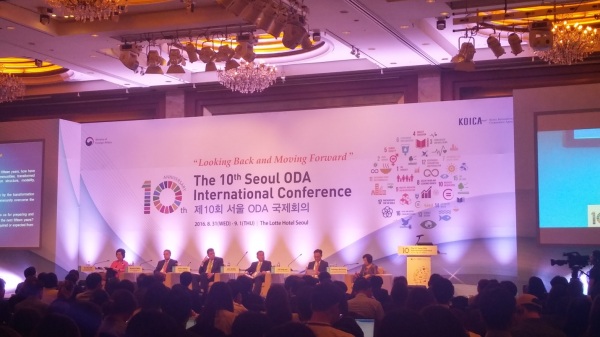On August 31st to September 1st 2016, The Ministry of Foreign Affairs Republic of Korea in collaboration with the Korea International Cooperation Agency ( KOICA) successfully organized The 10th Seoul ODA International Conference in The Lotte Hotel, Seoul, Republic of Korea. For years, the Seoul ODA Conference has been a platform in the field of international development cooperation in Korea.

In the landscape of international development, last year marks an important time for the global agenda with the launch of the Sustainable Development Goals (SDGs), the Paris Agreement 2015 under the UNFCCC, and the Addis Ababa Action Agenda (AAAA). The global agenda serves as an international consensus to advance development efforts globally, as well as to provide new approaches on the way development intervention is practiced.
The new framework of SDGs has brought more inclusive approaches in sustainable development including the economic, social, and environmental aspect altogether. Official Development Assistance (ODA) has always been an essential part of the global and national practice of development. Therefore, the shift in development approaches would also influence how ODA is carried and utilized across development actors globally.
In this regard, the 10th Seoul ODA international Conference serves to facilitate the reflection of past efforts during the Millennium Development Goals (MDGs), as well as the projection of development interventions under the era of SDGs. The conference was divided into three sessions with each session serves as a platform to discuss related topics regarding the role of ODA under the SDGs framework.
The first day was started with two topics including Lessons Learned from the Past, and Means of Implementation of SDGs. Speakers were not only from the public and international organizations, but also from private sector, academics, and civil society organizations.
The first session, ‘Lesson Learned from the Past’ covered different topics on the achievements, pitfalls, and challenges of MDGs as well as what MDGs contributed to the development interventions globally. Speakers representing different development organizations including the United Nations Development Programme (UNDP), United Nations Populations Fund (UNFPA), Ministry of Foreign Affairs Republic of Korea, USAID, and Vietnam Institute for Development Strategies were present. Among them, the topic of Goal Number 3 MDGs (Gender Equality and Women Empowerment) was agreed to be one of the most successful efforts across the globe. However, the issue of inequality still remains as a pitfall of different ranges of development interventions. Hence, taking this as a point of consideration and lesson learned, the issue of tackling inequality came up within the new framework of SDGs.
The session ‘Means of Implementation’ covered different topics on diversifying resources in supporting the SDGs. The session is moderated by Kilaparti Ramakrishna, the Director of UN ESCAP East and North-East Asia office. Different speakers from various backgrounds including UNCDF, Ministry of Finance and Economic Cooperation, KOICA, and Impact Investment Exchange Asia were present discussing the positioning of ODA as well as other resources to finance the implementation of SDGs. It was agreed that, although ODA has been an essential part of the discussion of financing development globally, financing the SDGs which are much more ambitious and universal also needs more ambitious sources to achieve the goals by 2030. Among all speakers in this session, Durreen Shahnaz, who has been working in impact investing in Southeast Asia, introduced the concept of impact investing, the concept of investments intended to create positive social impact beyond financial return, as additional sources in the diversification of SDGs funding.
The two days conference was closed by the discussion of ‘New Approach of Inclusiveness in the Era of SDGs’. As a more ambitious global agenda, the SDGs were seen to be more inclusive globally. Unlike MDGs that were focusing in developing countries, SDGs targets a universal coverage including developed countries. In addition, the sense of participatory and ownership are also two important parts in the SDGs implementation which countries could adopt in the process of designing their own development priorities.
Seoul ODA conference has been conducted annually for 10 years and will be serving as a place of development practitioners to share their insights and knowledge on development efforts in the upcoming years.
By Cresti Eka Fitriana
Cresti is from Indonesia and she holds Master of Arts in International Development from Hankuk University of Foreign Studies (HUFS) in Seoul, Republic of Korea. She is a former awardee of Korean Government Scholarship Program (KGSP) and is specialized in areas including migration & development, social policy & inclusion, and ASEAN region.
